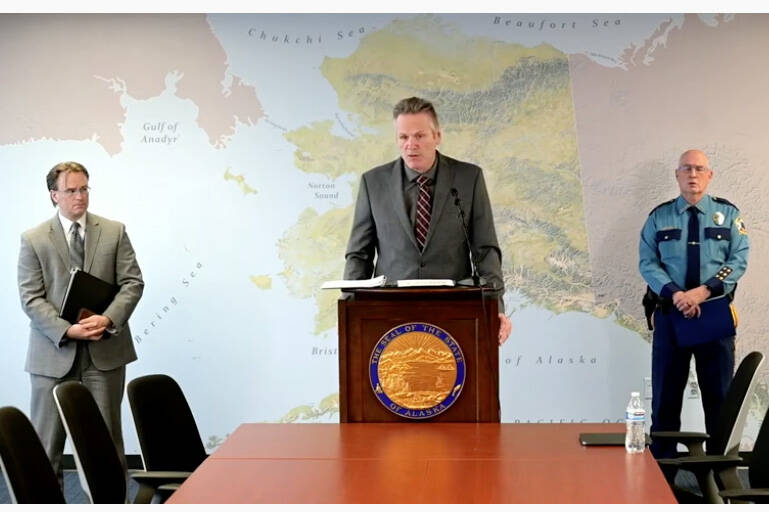Gov. Mike Dunleavy provided details Monday on a bill he plans to present to the Alaska Legislature next session that proposes more severe penalties for drug dealers in the state.
Dunleavy condemned fentanyl, a synthetic opioid that the U.S. Drug Enforcement Administration says is between 80 and 100 times stronger than morphine, in his remarks Monday. The Alaska Department of Health, formerly part of the Alaska Department of Health and Social Services, announced earlier this year a “sharp increase” in overdose deaths in 2021, which it attributed to a rise in fentanyl use.
The initiative proposed by Dunleavy, who is up for reelection next month, would increase a manslaughter offense to a murder in the second degree offense in instances where someone dies as a direct result of ingesting a controlled substance that is made or delivered in violation of Alaska’s drug statutes.
That crime is currently a class A felony punishable by up to 20 years in prison. Murder in the second degree is an unclassified felony with a maximum sentence of 99 years with a 15-year minimum.
The initiatives discussed by Dunleavy on Monday would also eliminate “good time” parole for drug dealers, referring to mandatory parole allowed for most crimes under Alaska’s criminal statutes for good behavior. According to a document from Dunleavy’s office, a prisoner can be released after serving a portion of their sentence except for in the case of some crimes, determined to be “not deserving” of early release.
“Peddling poison in the form of dealing illicit drugs should fall within this category,” the document says. “The harm caused not only to the end user, but to society at large make these crimes of distributing drugs worthy of this sort of condemnation.”
The number of drug overdose deaths increased by 68% over the course of one year, the department said, from 146 drug overdose deaths in 2020 to 245 in 2021. Last year, 140 drug fentanyl overdose deaths were reported in Alaska. Of those, 61% also involved methamphetamine and 28% also involved heroin.
The Alaska Department of Public Safety announced earlier this month that the department had seized more than 212 pounds of illegal narcotics, including about 2.45 million “potentially fatal doses” of illicit fentanyl.
Lastly, the initiative would create a vehicular homicide statute within Alaska’s criminal statute. Currently, homicide charges involving a vehicle must be brought forth as manslaughter, criminally negligent homicide or murder in the second degree charges. The proposal would establish aggravated vehicular homicide, vehicular homicide and negligent vehicular homicide statutes.
Alaska Deputy Attorney General John Skidmore said during Monday’s press conference that the initiatives regarding vehicular homicide would not be changing existing law, but rather codifying current Alaska case law.
“The vast majority of vehicular homicides that occur in our state are committed by individuals under the influence of controlled substances,” Skidmore said. “We’re not changing the law of vehicular homicides. Let me be very clear about that. We are not changing the law. What we are doing is codifying current case law.”
Monday’s full press conference can be streamed on Dunleavy’s YouTube channel.
Reach reporter Ashlyn O’Hara at ashlyn.ohara@peninsulaclarion.com.

